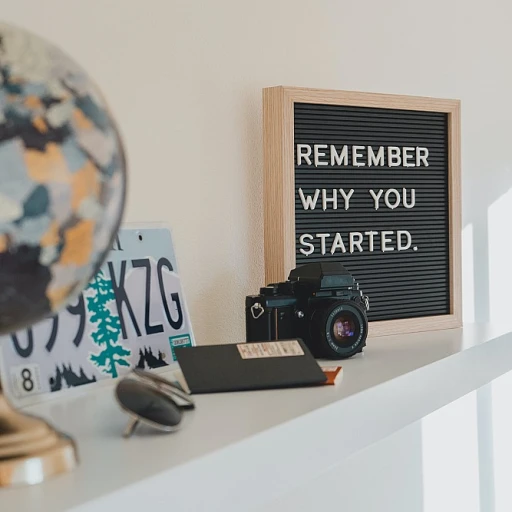
What Is Personal Branding and Why Should You Care?
The Essence of Personal Branding
In an age where your online footprint is just as significant as your real-world presence, personal branding has emerged as a crucial strategy for professionals across the globe. It's a way to showcase your unique value proposition, to stand out in a crowded market, and to connect authentically with your target audience. Think of your personal brand as a fusion of your skills, experience, and personality – it's the story you choose to tell about yourself. And it's not just for influencers or celebrities – it's a powerful tool for anyone aiming to advance their career.
When one considers industry titans like Elon Musk or Richard Branson, it's clear that a robust personal brand can transcend the confines of a traditional resume. These leaders have harnessed the power of branding to cement a legacy that resonates with their audience. But it's not limited to the realm of CEOs – professionals at all levels are now recognizing that developing a strong personal brand can significantly bolster visibility and open doors to new opportunities.
Personal Branding by the Numbers
Numbers don't lie, and the stats surrounding personal branding indeed paint a compelling picture. For example, Fortune reports that CEOs with personal blogs receive high marks for credibility from their readers. Additionally, a survey conducted by Upwork suggests that freelancers with a robust online presence command higher rates and experience increased demand. Furthermore, according to a Google study, nearly 50% of buyers vet professionals online before engaging in a business relationship, emphasizing the importance of a polished professional online persona.
Leveraging the Digital Sphere
To build personal brand equity, leveraging the vast array of digital tools at your disposal is imperative – from social media profiles to a well-crafted personal website. Establishing a presence on platforms like LinkedIn, Twitter, and even industry-specific forums can help you articulate your expertise, share your insights, and incrementally build your personal brand. Each post, article, and comment contributes to an overarching narrative about who you are and the value you bring to the table.
By regularly contributing to conversations and sharing valuable content, you demonstrate not just what you know, but also how you think and communicate – key components of an effective personal branding strategy. In one instance, a Forbes Coaches Council report highlights how professionals can utilize these platforms to sharpen their thought leadership and build a rapport with their audience over time.
Within the framework of personal branding, each digital interaction is an opportunity. And as you create content, remember the importance of authenticity. Sharing real experiences and genuine insights helps forge a deeper connection with your audience, which can be the difference between being just another professional online and a trusted industry name.
If you're keen to delve deeper into how strategic vision can amplify your personal brand, explore the insights at Harnessing Leadership Synergy: The Intersection of Vision and Execution.
The Pillars of Developing a Strong Personal Brand
Establishing Your Unique Value Proposition
Carving out a niche in your professional arena starts with identifying your unique value proposition (UVP). This distinct element of your personal branding sets you apart from the competition. According to a survey by the Forbes Coaches Council, 93% of professionals successfully fostering a strong personal brand credited understanding their unique value as pivotal. Reflecting upon what you bring to the table that no one else can is not just introspection; it's strategic differentiation.
Consistency is Key in Branding
When people hear 'consistency,' they often think repetition, but in personal branding, it's about alignment—ensuring your actions, words, and professional presence convey the same message. A Harvard Business Review study found that brands displaying consistency could see an increase in revenue up to 23%. Whether it's your content, communication style, or work ethic, uniformity across all platforms enhances your personal brand's credibility.
Leveraging Your Network
Your network is a treasure trove for personal brand enhancement. Endorsements and recommendations from peers, mentors, or industry leaders can act as powerful testimonials. LinkedIn data shows that professionals with five or more skills listed on their profiles receive up to 17x more profile views, a clear indication of the power of a well-rounded professional image supported by a robust network.
Building a Cohesive Narrative
A compelling personal story isn't just engaging, it's the bedrock of your brand. Crafting a narrative that interweaves professional experiences, personal milestones, and unique skills into a cohesive story can be profoundly impactful. Storytelling in the Digital Age: A Guide for Nonprofits by Julia Campbell details how narrative-driven content can captivate and resonate with your target audience, fostering lasting connections.
Learning and Adaptability: Your Brand's Growth Engines
Continuous learning and adaptability are the engines that will drive your personal brand's growth. As demands in the market change, so should your approach to personal branding. In the tech sphere, for example, insights from the Pew Research Center highlight an increasing need for continual skill development, with 54% of employees requiring significant retraining. Staying ahead means demonstrating willingness to grow and adapt, pivotal for a lasting personal brand.
Crafting Your Brand Statement: A Beacon of Your Professional Identity
Zeroing In On Your Brand's Essence
Your personal brand statement is more than just a catchy tagline; it’s the crystallization of your professional essence. It should encompass who you are, what you stand for, and your unique value proposition. Think of it as your professional DNA, the genetic code that sets you apart in a crowded market. Take Steve Jobs for example, whose personal brand became synonymous with innovation and design simplicity, reflecting heavily on Apple’s branding ethos.
Nailing Down Your Brand's Narrative
Crafting your brand statement might seem daunting, but it's essentially the storytelling of 'you'. It’s how strategic pathways for professional growth are paved. It condenses your skills, accomplishments, and aspirations into a narrative that resonates with your target audience. Richard Branson is a vibrant example; he encapsulates the spirit of adventure and entrepreneurship, which not only elevated his personal allure but also amped Virgin’s brand image.
Alignment With Career Goals
A personal brand statement should align seamlessly with your career objectives. Just like a lighthouse guiding ships through turbulent seas, this statement acts as your navigational beacon, maintaining your course throughout professional endeavors. It elucidates your direction and keeps your branding efforts targeted and coherent. Whether you’re a freelancer on Upwork or a professional seeking to climb the corporate ladder, it clarifies your endgame to potential employers or clients.
Live And Breathe Your Brand Promise
Creating your statement isn't where the job ends; living up to it is where the work truly begins. Your daily professional interactions, online presence, and the content you create – all should reflect your brand promise. It’s what differentiates a well-crafted brand statement from an empty slogan. Elon Musk’s dedication to space travel and clean energy through SpaceX and Tesla, respectively, is evident in his every move, reinforcing his personal brand as a visionary innovator.
Examples of Exemplary Brand Statements
Take inspiration from figures like Gary Vaynerchuk, renowned for his relentless hustle and expertise in digital marketing, his personal brand mirrors his business acumen and personal philosophy. Or Melyssa Griffin, who empowers entrepreneurs and bloggers to achieve their goals, which resonates deeply through her online education platform.
In this bustling digital era, a powerful personal brand statement helps you stand out and be remembered. It’s your personal brand that often tips the scales in your favor, inviting opportunities to connect and engage with your audience on a deeper level.
The Content Conundrum: Creating a Compelling Personal Narrative Online
Carving Out Your Digital Narrative: Strategies for Impactful Online Storytelling
Your personal brand is not just about how you present yourself in person, it's also profoundly influenced by your online narrative. In today's digital sphere, engaging content is king, and if you're not sharing your story, you're not shaping your brand.
Master Your Medium: The Art of Sharing Content That Resonates
To truly captivate your audience, you have to understand where they spend their time and what kind of content sparks their interest. Whether it's building a sleek personal website, sharing insights on LinkedIn, or making waves with witty tweets, each platform has its unique language that you'll need to speak fluently. Crafting meaningful and authentic content is a powerful way to show off your skills, values, and professional achievements to both your existing network and potential employers or clients.
From Story to Strategy: Crafting Content with Intention
Your content should be more than just noise in the vast ocean of online information. A strategic approach to content creation means aligning each post, article, and video with your brand’s core message. Whether you’re an aspiring thought leader, a creative freelancer, or a seasoned executive, consistently sharing your expertise will not only build credibility but also solidify your narrative in the minds of your followers.
Engaging Authentically: The Secret Ingredient in Personal Branding
While data and strategy form the backbone of your online brand, it's the authentic connections that breath life into it. By interacting with your audience—including responding to comments and joining broader discussions—your personal brand becomes relational rather than static. It's these genuine connections that can turn passive onlookers into active advocates of your brand.
Decoding the Impact of Social Media on Personal Branding
Understanding Social Media's Role in Your Brand Ecosystem
When it comes to personal branding, navigating the social media landscape is not just beneficial; it's essential. Richard Branson's eclectic Twitter presence and Elon Musk's market-moving tweets underscore the power of social media in building a personal brand. Social media profiles are like open books that narrate one's professional journey, highlight accomplishments, and provide a platform for engaging with the target audience. With billions of users, platforms like LinkedIn, Instagram, and Twitter are not simple networking tools but integral elements in creating a personal brand. A well-curated social media strategy can enhance visibility and establish a personal connection with your audience.
The Vital Statistics: Social Media's Influence on Brand Perception
The numbers don't lie: according to Forbes, a commanding 92% of people trust personal brands over traditional advertising. Furthermore, a study by Nielsen reported that content shared by individuals receives double the engagement compared to that shared by companies. These statistics show the value in leveraging social platforms to build personal credibility and foster trust.
Aligning Content Strategy With Branding Goals
Your content is your currency in the digital sphere. Whether it's through insightful blog posts, dynamic videos, or compelling infographics, your content should reflect your brand's values and resonate with your audience. Nesha Woolery, with her clear, practical approach to design and productivity, has grown an audience who relies on her consistent, value-packed posts. Similarly, Gary Vaynerchuk's no-nonsense style has cemented his reputation as a digital marketing guru. Tailoring your online material to demonstrate your unique skills and story can serve as a powerful personal branding statement.
Personal Brand Social Media Success Stories
The influence of social media can be seen in various branding success stories. Alice Thorpe, who used her exceptional design skills to engage an audience on YouTube, and Melyssa Griffin, who empowers entrepreneurs on multiple platforms, are sterling examples of effective personal branding. Their social profiles are testaments to building engagement through consistent and authentic storytelling.
Real-Time Brand Building: Leveraging Social Media Interaction
Social media is not just a broadcasting platform; it's a two-way conversation. Successful personal brands understand that interaction and engagement are crucial. By responding to comments, sharing user-generated content, and participating in online discussions, one can develop stronger connections with their audience. This ongoing engagement is pivotal in developing a personal brand that is both relatable and influential.
Personal Branding Pitfalls to Avoid on Social Media
While social media offers unparalleled opportunities for brand development, missteps can occur. Sharing inconsistent messaging, over-promotion without valuable content, and neglecting privacy considerations can damage a brand's integrity. Maintaining a professional online presence that is also personable can help avoid these pitfalls and ensure your social footprint advances your personal branding strategy.
Case Studies: Personal Branding Triumphs from Google to Gary Vaynerchuk
Real-Life Tales of Personal Brand Enlightenment
Let's take a moment to spotlight the power players who've carved a niche for themselves in the bustling marketplace. Legendary names like Elon Musk and Richard Branson spring to mind when we discuss personal branding triumphs. These entrepreneurs stand as testaments to the power of individual influence. Musk's personal brand, associated with innovation and audacity, has propelled his companies, like Tesla and SpaceX, into the stratosphere. On the other hand, Branson’s adventurous spirit and charismatic leadership have become the hallmark of the Virgin Group.
Nesting in the tech universe, Google has imparted its branding wisdom to not just its corporate identity, but also to its leading figures. Sundar Pichai, with his calm and collected persona, reflects the efficient and innovative ethos of Google. Their approach to personal branding extends beyond the walls of their famed headquarters, as seen through initiatives that allow their employees to cultivate strong personal brands.
From Silicon Valley to Social Media Sagas
Transitioning from tech titans to social media moguls, we find a vivid pageantry of personal brand narratives. Names like Gary Vaynerchuk – a wine critic turned digital marketing guru – have flourished by leveraging platforms where content and audience dovetail perfectly. Vaynerchuk's blend of no-nonsense talk and hustle has entrenched his brand in the entrepreneurial domain.
Looking at social media platforms, we’ve witnessed how personal branding can skyrocket one's career. Digital creators like Alice Thorpe and Nesha Woolery have utilized their skills and online presence to create engaging, relatable content that resonates with their audiences. Their ability to build personal brands through a genuine depiction of their professional journey underpins the effectiveness of authenticity in branding.
Diverse Pathways to Personal Brand Success
It's not just the heavy-hitters of the business world who've seized the reins of personal branding. Professionals from various fields, including those listed on the Forbes Coaches Council, assert that a personal branding strategy is as indispensable as a well-tailored suit. Whether it’s public speaking engagements, a consistent narrative across social media profiles, or a dynamic personal website portfolio, the avenues to develop personal brand are as diverse as the personalities pursuing them.
One standout example from the creative realm is Alice Thorpe, a graphic designer whose personal brand has evolved alongside her business. Thorpe’s journey illustrates the synergy between evolving skills and an adaptive online persona that continues to engage and inspire her growing audience.
In the consulting sphere, personal brand examples like Melyssa Griffin exemplify how delivering value through educational content can establish one as an authority in their field. Griffin's transparent sharing of her growth and learning process enables her audience to connect on a more personal level, building trust and a strong follower base.
The Personal Brand Power Play
The takeaway from these case studies is clear: developing a strong personal brand isn’t confined to a formulaic blueprint; it's about embracing your narrative and sculpting an online presence that showcases your unique value. As the stories of personal brand maestros like Musk, Branson, and many others show, personal branding can be a game changer, setting the stage for professional opportunities and recognition in unprecedented ways.
Continuous Evolution: Updating Your Brand as You Grow
Adapting Your Personal Brand to Reflect Your Growth
Your personal brand is not just a static snapshot; it's an evolving story of your professional journey. Just as you upskill and pivot in your career, your personal brand must adapt to reflect these changes. Embracing this dynamic concept means staying abreast of new trends, re-evaluating your brand's alignment with your current objectives, and ensuring that the message you convey is synchronised with who you are today.
Mastering the Art of Rebranding Yourself
An effective rebranding strategy is critical when your career takes a significant turn. Whether you're climbing the corporate ladder, launching your own business, or shifting industries, your personal brand should encapsulate these developments. Richard Branson and Elon Musk have mastered pivoting their personal brands to align with their ever-growing business empires, demonstrating the power of a flexible branding approach.
The Role of Feedback in Personal Branding Evolution
Feedback, whether from your audience, peers, or mentors, is invaluable. It offers a lens through which you can gauge the effectiveness of your branding efforts. Taking this constructive criticism can help refine your brand, making it more relatable and authentic to your target audience. Business leaders often engage with followers on social media platforms to get this feedback and test how their brand resonates with their audience.
The Onward Journey: Lifelong Learning and Brand Development
Building a personal brand is an ongoing process, much like continuous education. To remain relevant, one must be a lifelong learner, adapting your narrative to match your growing expertise and experiences. This cultivation of knowledge is not only beneficial for your professional development but also for amplifying the value provided to your audience.
Techniques to Keep Your Brand Current and Engaging
Creating content that reflects your active involvement in your field can demonstrate to others that your brand is a living entity. Sharing your perspectives on current industry trends, publishing thought leadership articles, or even starting topical discussions on platforms like LinkedIn are fantastic ways to keep your brand narrative current. Some professionals also opt for regular updates to their personal website portfolio to showcase their latest projects and achievements.
Navigating Controversies and Setbacks in Personal Branding
When Your Personal Brand Faces a Storm
Every journey encounters turbulence, and building a personal brand is no exception. It's not just about how you present yourself in calm waters but how you navigate through the stormy seas. Controversies and setbacks can be critical moments that test the resilience and authenticity of your brand. In these times, the way you address challenges can either strengthen your connection with your audience or diminish your brand's credibility.
Learning from High-Profile Brand Backlashes
A look at prominent figures like Elon Musk and companies such as Apple shows that no brand is immune to public scrutiny. Musk's occasional controversial tweets have sent Tesla's stock on a rollercoaster ride, yet his personal brand remains synonymous with innovation. Apple, despite facing several lawsuits regarding product performance, continues to be a powerhouse in tech innovation. Both demonstrate that while mishaps can affect the business, a strong foundation and transparent communication can mitigate lasting damage.
Transforming Blunders into Opportunities for Growth
Personal branding is not flawless; it's human. When facing negative publicity, the strategies you've developed become your toolbox for recovery. Social media can be a double-edged sword, yet it also offers a platform to respond swiftly and personally. Donald Trump and other political figures have shown that while a social media presence can lead to controversies, it also allows for direct engagement with supporters.
Case studies from figures like Richard Branson, who faced countless business challenges, reinforce the notion that handling setbacks with grace and accountability can even enhance a personal brand. Branson's responses to Virgin's hurdles are often seen as epitomizing the essence of effective personal branding.
Expert Insights on Navigating Brand Controversies
According to the Forbes Coaches Council, effective crisis management involves staying true to your brand statement while also being 'quick to apologize, quick to react, and transparent in every step.' Tools like a well-crafted blog post or earnest public speaking can help turn the tide. Align your recovery actions with the principles you've established in building your brand's narrative. It's consistency during times of controversy that often differentiates fleeting brands from everlasting names.
Developing a contingency plan before crises arise is also paramount. Nesha Woolery, noted for her clear and client-focused branding strategy, emphasizes the importance of having a clear message and values that one can revert to when faced with adversity.
Effective Personal Branding Through Authentic Response
Creating content that addresses setbacks head-on can demonstrate vulnerability and authenticity which audiences tend to appreciate. Confront issues openly rather than ignoring them, and use your online presence to reinforce a narrative of growth and learning. The audience will not expect perfection, but they will value honesty and effort in overcoming obstacles.
Remember, developing an effective personal branding strategy includes preparing for potential setbacks. It involves learning from the insights of branding experts and creating a playbook for preserving your reputation in the face of criticism. Share your lessons learned; this not only humanizes you but also serves as a testament to your commitment to personal development and professional integrity.














